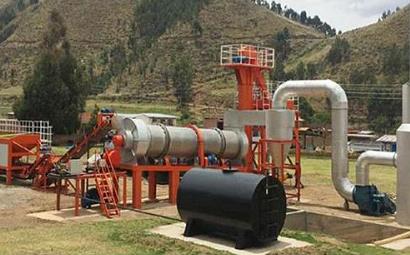The engine is the source of power for the vehicle. If the synchronous sealing vehicle wants to perform normal construction operations, it must ensure that the engine is in good condition. Routine maintenance is an important means to effectively prevent engine failure. How to maintain it is determined by Xinxiang Junhua Special Vehicle Vehicles Co., Ltd. will take everyone to understand.
1. Use lubricating oil of appropriate quality grade
For gasoline engines, SD-SF grade gasoline engine oil should be selected based on the additional devices and usage conditions of the intake and exhaust systems; for diesel engines, CB-CD grade diesel engine oil should be selected based on the mechanical load. The selection standards should not be lower than the requirements specified by the manufacturer. .
2. Regularly replace engine oil and filter elements
The quality of lubricating oil of any quality grade will change during use. After a certain mileage, the performance deteriorates and will cause various problems to the engine. In order to avoid the occurrence of malfunctions, the oil should be changed regularly according to the operating conditions, and the oil amount should be moderate (generally the upper limit of the oil dipstick is good). When the oil passes through the pores of the filter, solid particles and viscous substances in the oil are accumulated in the filter. If the filter is clogged and the oil cannot pass through the filter element, it will rupture the filter element or open the safety valve and pass through the bypass valve, which will still bring dirt back to the lubrication part, causing engine wear.


3. Keep the crankcase well ventilated
Nowadays, most gasoline engines are equipped with PCV valves (forced crankcase ventilation devices) to promote engine ventilation, but pollutants in the blow-by gas "will be deposited around the PCV valve, which may clog the valve. If the PCV valve is clogged, the polluted gas will flow in the opposite direction. It flows into the air filter, contaminating the filter element, reducing the filtration capacity, and the inhaled mixture is too dirty, which further causes crankcase pollution, leading to increased fuel consumption, increased engine wear, and even engine damage. Therefore, the PCV must be maintained regularly , remove contaminants around the PCV valve.
4. Clean the crankcase regularly
When the engine is running, high-pressure unburned gas, acid, moisture, sulfur and nitrogen oxides in the combustion chamber enter the crankcase through the gap between the piston ring and the cylinder wall, and are mixed with metal powder produced by parts wear. Formation of sludge. When the amount is small, it is suspended in the oil; when the amount is large, it precipitates from the oil, blocking the filter and oil holes, causing difficulty in engine lubrication and causing wear. In addition, when the engine oil oxidizes at high temperatures, it will form paint film and carbon deposits that will stick to the piston, which will increase the engine's fuel consumption and reduce its power. In severe cases, the piston rings will become stuck and the cylinder will be pulled. Therefore, regularly use BGl05 (quick cleaning agent for lubrication system) to clean the crankcase and keep the inside of the engine clean.
5. Clean the fuel system regularly
When fuel is supplied to the combustion chamber through the oil circuit for combustion, it will inevitably form colloid and carbon deposits, which will deposit in the oil passage, carburetor, fuel injector and combustion chamber, interfering with the flow of fuel and destroying normal air conditioning. The fuel ratio is poor, resulting in poor fuel atomization, causing engine shuddering, knocking, unstable idling, poor acceleration and other performance problems. Use BG208 (a powerful and efficient fuel system cleaning agent) to clean the fuel system, and regularly use BG202 to control the generation of carbon deposits, which can always keep the engine in good condition.
6. Regularly maintain the water tank
Rust and scaling in engine water tanks are common problems. Rust and scale will restrict the flow of coolant in the cooling system, reduce heat dissipation, cause the engine to overheat, and even cause engine damage. The oxidation of the coolant will also form acidic substances, which will corrode the metal parts of the water tank, causing damage and leakage of the water tank. Regularly use BG540 (a powerful and efficient water tank cleaning agent) to clean the water tank to remove rust and scale, which will not only ensure the normal operation of the engine, but also extend the overall life of the water tank and engine.
 Albanian
Albanian  Russian
Russian  Arabic
Arabic  Amharic
Amharic  Azerbaijani
Azerbaijani  Irish
Irish  Estonian
Estonian  Odia (Oriya)
Odia (Oriya)  Basque
Basque  Belarusian
Belarusian  Bulgarian
Bulgarian  Icelandic
Icelandic  Polish
Polish  Bosnian
Bosnian  Persian
Persian  Afrikaans
Afrikaans  Tatar
Tatar  Danish
Danish  German
German  French
French  Filipino
Filipino  Finnish
Finnish  Frisian
Frisian  Khmer
Khmer  Georgian
Georgian  Gujarati
Gujarati  Kazakh
Kazakh  Haitian Creole
Haitian Creole  Korean
Korean  Hausa
Hausa  Dutch
Dutch  Kyrgyz
Kyrgyz  Galician
Galician  Catalan
Catalan  Czech
Czech  Kannada
Kannada  Corsican
Corsican  Croatian
Croatian  Kurdish (Kurmanji)
Kurdish (Kurmanji)  Latin
Latin  Latvian
Latvian  Lao
Lao  Lithuanian
Lithuanian  Luxembourgish
Luxembourgish  Kinyarwanda
Kinyarwanda  Romanian
Romanian  Malagasy
Malagasy  Maltese
Maltese  Marathi
Marathi  Malayalam
Malayalam  Malay
Malay  Macedonian
Macedonian  Maori
Maori  Mongolian
Mongolian  Bengali
Bengali  Myanmar (Burmese)
Myanmar (Burmese)  Hmong
Hmong  Xhosa
Xhosa  Zulu
Zulu  Nepali
Nepali  Norwegian
Norwegian  Punjabi
Punjabi  Portuguese
Portuguese  Pashto
Pashto  Chichewa
Chichewa  Japanese
Japanese  Swedish
Swedish  Samoan
Samoan  Serbian
Serbian  Sesotho
Sesotho  Sinhala
Sinhala  Esperanto
Esperanto  Slovak
Slovak  Slovenian
Slovenian  Swahili
Swahili  Scots Gaelic
Scots Gaelic  Cebuano
Cebuano  Somali
Somali  Tajik
Tajik  Telugu
Telugu  Tamil
Tamil  Thai
Thai  Turkish
Turkish  Turkmen
Turkmen  Welsh
Welsh  Uyghur
Uyghur  Urdu
Urdu  Ukrainian
Ukrainian  Uzbek
Uzbek  Spanish
Spanish  Hebrew
Hebrew  Greek
Greek  Hawaiian
Hawaiian  Sindhi
Sindhi  Hungarian
Hungarian  Shona
Shona  Armenian
Armenian  Igbo
Igbo  Italian
Italian  Yiddish
Yiddish  Hindi
Hindi  Sundanese
Sundanese  Indonesian
Indonesian  Javanese
Javanese  Yoruba
Yoruba  Vietnamese
Vietnamese  Hebrew
Hebrew  Chinese (Simplified)
Chinese (Simplified)







